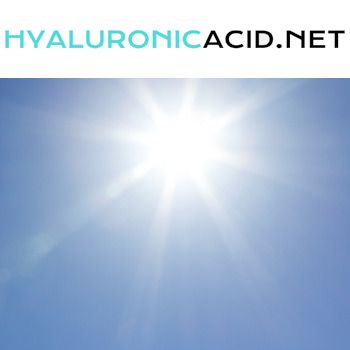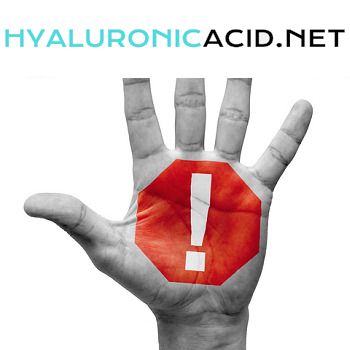Hyaluronic acid is a natural compound in the bodies of humans, with high concentrations in fluids in the eyes and joints. It is an acid with various health benefits. Popular in cosmetics as an agent of skin aging treatment, the acid is also said to be beneficial for the hair, eyes, joints, and many other diseases. As per scientific research, hyaluronic acid isn't just an external component, rather, is present in our bodies and helps maintain the right look. It is also known as hyaluronic, HA, and hyaluronate.
Hyaluronic acid, considered to be a high molecular weight substance, is made from glucuronic acid and N-acetyl glucosamine, both of which are two simple sugars that have been modified by the body. HA works as a source of lubrication in the body. It is cannot be easily compressed.
HA plays a key role in the hydration of the skin as well as in various treatments.

Hyaluronic acid functions as a cushion and lubricant for joints and various other tissues. It also affects the way the body responds to injury.
The levels of Hyaluronic acid which is naturally present in our body tend to fall as we age, almost by 50 percent. This loss is often accelerated by habits like smoking, magnesium and zinc deficiencies or by genetics itself which eventually results in painful joints and drooping skin. Therefore, it becomes imperative to supplement the naturally existing Hyaluronic acid concentration in order to promote healthy skin and flexible joints.
FOOD:
Meat Soup: The boiling bones of chicken, beef, and meat are a healing medicine. It is a highly hyaluronic acid rich food and carries with it nutrients such as calcium, collagen, chondroitin sulfate, magnesium, etcetera.
Meat: Animal meat possesses high levels of hyaluronic acid. Meat such as, beef, lamb, pork and poultry products along with the eyeballs of fishes and other animals are sources of hyaluronic acid, and consuming it even in small amounts is highly helpful.
Soy: Soybeans or soy products possess high levels of isoflavones which in turn contain phytoestrogens. Due to these, soybean/soy products act as a very rich source of hyaluronic acid. The phytoestrogens, which act like estrogens, help produce hyaluronic acid in the body. Consuming products like tofu, cheese, and soymilk, act as a good source in the treatment of many diseases which arise due to the lack of hyaluronic acid in the system.
Vitamin C (Source): Vitamin C is essential in the production of hyaluronic acid in the body, and acts as a substitute for animal meat and meat soup. Papaya, kiwi, orange, berries, green vegetables, are some of the sources rich in Vitamin C.
Red Wine: Red wine is a product of grape skin which is a great source of phytoestrogen, which in turn help in creating hyaluronic acid in an indirect manner. If taken in controlled amounts, red wine acts as a rich alternative of manufacturing hyaluronic acid in the body. In fact, a glass of red grape juice is also very helpful.
Magnesium: Products rich in magnesium, such as vegetables, potatoes, broccoli, and the like, contain high levels of magnesium in it.
SKIN:
Collagen: Collagen, an important protein for skin elasticity and the renewal of cells, possesses more than fifty percent of the hyaluronic acid present in the body. It acts as a great source of moisture to the skin due to its ability to hold on to approximately s thousand times its molecular weight. All this leads to hyaluronic acid being an agent, which helps decrease wrinkles, helps in skin softening, and makes the skin smoother. It also helps in taking away products that are waste from the cellular structures, including in areas with poor circulation.
Therapy/Surgeries: Due to its magical properties, hyaluronic acid is used therapeutic procedures today, to fight skin aging. It is also used it various cosmetic procedures that attempt to eradicate wrinkles and other imperfections of the skin. But since hyaluronic acid is broken down by the body all the time very often, all these therapies and procedures need to be repeated to sustain the same effect, which often burns a hole in people’s pockets. For cosmetic surgeries, professionals have stated that hyaluronic acid is far safer option to use and acts as a substitute to collagen injections.
Skin Benefits: Some of its benefits include healing wounds, which is one of the most popular aspects among those who have used it. Apart from it offering general skin care, hyaluronic acid is very useful in treating burns and various other wounds. Unfortunately, no established research backs these claims and is a result of the review of some of the consumers who used it.
UV Rays: Use of hyaluronic acid is often a solution to protect the skin from damage caused by UV rays of the sun.
ANTI-AGING:
Research proves that plumping the skin to smooth out wrinkles is one of the procedures done with the help of the hyaluronic acid. Concerning anti-aging, even though no clear claim by research proves the benefits of hyaluronic acid, yet some studies and review by some patients are something to be considered. But there are various cases with no noticeable results from this point of view.
HAIR:
Hyaluronic acid is not only beneficial for the skin, but also for the hair and the scalp. It helps in preventing a dry scalp, and also controls hair from thinning and hair fall. Therefore, many dermatologists are of the opinion that hyaluronic acid is an asset for cosmetic purposes and is also highly advisable for children who suffer from progeria, to treat symptoms such as premature aging, and hair loss.
According to a leading dermatologist Dr. Paradi Mirmirani, hyaluronic acid acts as a fertilizer as it increases hair growth and makes the hair thicker. Dermatologists have not determined whether taking hyaluronic acid orally or applying it gerenally works better.

Hyaluronic Acid can be found in the following forms:
Elavonne's Amino Collagen C with Hyaluronic Acid- It promotes skin fullness and lessens the appearance of wrinkles and skin discoloration.
Élavonne offers an Organic skin care line focused on providing maximum anti-aging benefits of Hyaluronic Acid without harmful ingredients.
Everybody needs hyaluronic acid. However, the following require more levels of hyaluronic acid than others and are an addition to the list given before:
-Bodybuilders: They injure their muscles on a daily basis. Their musculoskeletal system depletes hyaluronic acid more quickly, which is why many bodybuilders can benefit from its supplements for reduced recovery time.
-For Osteoarthritis Sufferers
-For Immune System Support: Hyaluronic acid is beneficial for those with suffering from suppressed immunity problems, as it has been observed that it contains infection-fighting properties.